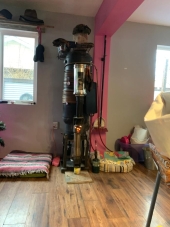posted 12 years ago
I know this is an old post, but wanted to share some info for folks who may find this in their searching... having a stove/furnace/boiler plumbed like this can be a bad idea... Aside from the furnace running away and causing steam (bad), you have the problem of what if your fire goes out? Then the water will freeze and you'll have some serious repairs to do. Outdoor boilers have a sealed, separate "water" system, this is treated with a "less dangerous" anti-freeze like you would use in an RV for winter storage. That heated fluid is then run to a heat exchanger to heat your hot water with, much the same as a professional solar water heater is. I have seen some of my friends loop copper pipe around their flue on an indoor wood heater, it kinda worked, but wasn't great, had a few seconds of super hot scald your hands water, then a few minutes of luke warm, then room temperature if they were lucky.
In a wood fired boiler, you have a storage tank to store the hot water and it is circulated through the heater, by just running your house water through the boiler, you have no circulation when the water isn't running out of a faucet.
You then have special pumps to handle the heated liquid, insulated piping so you don't lose your heat, insulated storage tank, and a heat exchanger of some sort. All of this can be home built, but it's not easy to do. A heat exchanger can simply be a copper coil of your heated fluid snaked through an old hot water heater tank, BUT... you have to be able to get the copper coil in there and make bulkheads that will hold the pressure that your house water is running at. Quite a few hot water heater tanks are glass... If you can weld stainless steel and weld it to hold pressure, then it's a go. Making it out of other inferior steel will work, but it will rust and who knows how long it will last.
There are other ways to make this, obviously. But, by simply running a line from your house around a wood stove, it's not going to be satisfactory and could prove dangerous. Steam can be very explosive.
I currently build outdoor forced air wood furnaces, they work great in the southern appalachian mountains, not sure how well they would do in an area where it gets REALLY cold though, that is where the efficiency of heating a fluid rather than air would pay off (I heat the air from inside the home, not outside cold air). For myself and all my friends who I have helped build them, they work fabulously, just no way to easily heat water with them. You really have to have an anti-freeze fluid, with a large tank to prevent steam flash, several safety measures just in case steam flash happens, and a heat exchanger not to mention for some reason that I am too ignorant to understand, these water systems coupled with wood tend to fail quickly and have to be refurbished/replaced within 5-10 years.
I have built 1 outdoor wood boiler, ended up costing quite a bit. Be wary of the "price" you're quoted in buying these as they are rarely a price for a turn-key heating system, they usually only include the furnace and storage tanks and not the rest of the system to actually heat your home or water.
Just to add... I found a really nice on demand propane water heater at a local thrift store. Someone donated it, very nice unit, got it for 10 bucks. I've been playing with it, but haven't plumbed it into my system yet, since these things operate on temperature rise and mine has adjustable heating, I'm just planning on running it AFTER my electric hot water heater. I can keep the electric set as low as it will go (somewhere around 90), and then not have to run the on demand water heater at full capacity since it won't be heating 50 degree water. This isn't so much for cost saving as it is for being able to have enough hot water to fill our entire garden tub in one go and to be able to have full functionality of our home using just a small generator if the power goes out for short term storms/outages. In this scenario, I would turn off the electric hot water heater, and use only the propane on demand unit. The only high draw device would be the well pump, whereas a well pump AND an electric hot water heater require a substantial amount of power, this would put you in a large expensive generator category. This may prove to be cheaper on our utility bills since we are a couple and don't use hot water constantly, just to wash dishes and 2 people bathing, for a family it may or may not be cheaper, probably not when you factor in the cost if one was bought new and all the installation material costs.
If someone else comes along and knows of a way that works and works well to heat your water using wood, I would truly love to hear about it. Send me a mooseage as I might not see a post on here! I'm always willing to learn and share knowledge.
Ajila Ama Farm Western North Carolina
www.facebook.com/ajilaama




















